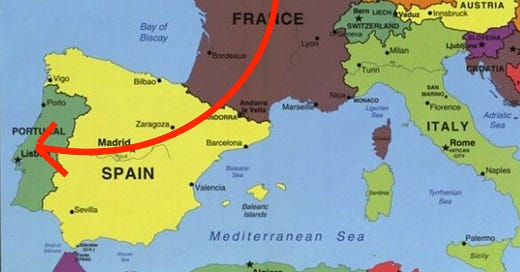If you have been reading along you know that part of the reason we left the United States was my concern about the direction the country was taking. While I know democracy is under attack around the world, somehow Portugal seemed “safer”. But with the election in France, it seemed it was time to take another look.
France
I am not certain how widely the election in France is being covered outside of Europe. It seems a big deal to me. Macron beat Marine Le Pen five years ago garnering 66% of the vote. Of course, then he was the outsider … the good-looking, new guy many felt the country needed. He is no longer the shiny, new penny. During his term, he has had some good times (making good on his promise to make it easier for companies to fire workers, cutting taxes, and bringing unemployment down from 10% to 7.4%) and bad times (gilets jaunes, the yellow-vest protesters rocked France in 2018 and 2019.)
Meanwhile, his opponent is no longer the furthest right candidate, having been replaced by the even more extreme Eric Zemmour. At the same time, she is clearly anti-immigration (would ban the Islamic hijab from being worn in public places) and anti-EU (turn the European Union into an alliance of nations unchallenged by EU laws and pull France out of Nato's integrated command). She condemns the invasion of Ukraine, but worries about the effect of sanctions on the French economy. This past week she talked about her desire to once again enjoy normal relations with Russia. While trying to play down her past admiration for Russia's Vladimir Putin and not mentioning the fact that her 2017 campaign fund benefited from a Russian bank loan.
The “Centrist” Macron won round one with 27.1% to Le Pen’s 23.1% … but the winner won’t be decided until this weekend’s election. The war in Ukraine has seemed to provide Macron the bump he needs, but can he win a two-person race? We’ll know next week.

Spain
The troubling photo above was taken in February 2020 during the Carnival festival in Campo de Criptana, Spain. It featured Nazi uniforms, concentration camp inmates, and crematoria.
Against this backdrop, we await the next general election in Spain which is scheduled for December 2023. Many believe that the Vox party, a party right of the mainstream conservative party in Spain, which picked up 16 seats in the Castilla y León regional government, is set to exert greater power.
The far-right Vox party is set to form part of a regional Spanish government for the first time after cutting a deal to run the north-western autonomous community of Castilla y León with its bitter rivals in the conservative People’s party (PP)… Emboldened by finishing in third place behind the Socialists – and picking up 16 new seats in the 81-seat regional parliament – Vox had pushed for a place in government…Alfonso Fernández-Mañueco, the incumbent PP president of Castilla y León, finally acceded to its demands, saying his party had reached an agreement with Vox that would “allow for a solid and stable government”. — The Guardian, 10 March 2022
True to form, Vox is anti-immigration calling for the “reconquest of Spain” and the building of an “unbreachable wall”. They have railed against political correctness and called for the repeal of laws related to gender-based violence. They have sometimes used a slogan that sounds very much like Make Spain Great Again, spread misinformation via social networking platforms, and attacked mainstream journalists.
And in Portugal
And, in February, André Ventura, the leader of Chega, was banned from Twitter after three suspensions in less than twelve months. Twitter justified its action by citing its rules “against the rules (of the network) to promote violence, directly attack or threaten people on the basis of their race, ethnicity, sexual orientation, gender equality, religious affiliation, age, handicaps or illness”.
Am I the only one having dèjá vu after reading the prior two paragraphs?
Besides the obvious, there is another reason to care. María Ramírez, deputy managing editor of eldiario.es said it best during a recent interview on NPR.
For many years, Spain and Portugal were the Iberian Peninsula exception…there weren't any far-right parties. And probably it's because of history, because extreme right dictatorships dominated both countries until the '70s.
How quickly we forget…
Next Week: Easter in a Catholic country and “Little Lisbon”.






Thank you very much for summarizing the political atmosphere in France and Spain. We are in Our third week in Lisboa and left the US for the exact reason you stated (and because we lived in Texas where women's rights and anyone else that isn’t a white heterosexual male is under attack, and guns out number people.). But I digress….I feel that Macron will win. He is ahead this time by more than his first run and I am hoping that the French see through LePen’s shift from the far far right. Spain is a toss up and I am glad you’ve kept abreast of it and thank you for your research for our benefit. We will continue to enjoy our time in Portugal and hope saner minds prevail in further elections. Thanks again!
So glad you wrote about this, as depressing as it is. I feel like these days it's a battle between finding the best worst place to be and it's good to hear from someone who is already on the ground.